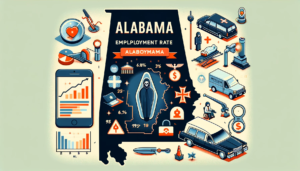How to Become a Mortician In Alabama?
In order to become a mortician in alabama you must have a high school diploma or its equivalent. You must also have a mortuary science degree from an institution or university certified by the american board of funeral service education (abfse).

Facts About Alabama –
Alabama is a southeastern United States state that is home to key Civil Rights Movement landmarks. In the 1960s, Birmingham’s 16th Street Baptist Church, now a museum, served as a protest center. Martin Luther King, Jr.’s church and the Rosa Parks Museum, both dedicated to the civil rights activist, may be found in Montgomery. Alabama is a southeastern United States state that is home to key Civil Rights Movement landmarks. In the 1960s, Birmingham’s 16th Street Baptist Church, now a museum, served as a protest center. Martin Luther King, Jr’s church and the Rosa Parks Museum, both dedicated to the civil rights activist, may be found in Montgomery.
Alabama’s cost of living is 12% lower than the national average. Housing costs 37% less than the national average, while utilities cost 8% more. When it comes to basic necessities like food and clothing, foodstuffs are around 4% cheaper than the rest of the country, while apparel is 4% cheaper.
What is the employment rate in Alabama?

According to the Bureau of Labour Statistics, the employment rate in Alabama was 3.7%. It’s important to remember that employment rates can change over time owing to a variety of economic and social reasons, so it’s always best to look at the most recent data. Alabama had a 3.7% unemployment rate. However, it’s important to keep in mind that unemployment rates can fluctuate over time due to a variety of economic and social factors, so it’s always best to consult the most recent data available for an up-to-date picture of the job market.
What are the career opportunities to become a mortician?
A job as a mortician can lead to a range of opportunities. As a funeral director, you would be in charge of overseeing funeral services, arranging logistics, and assisting bereaved families. You would prepare bodies for burial or cremation as an embalmer. Pre-need sales people offer pre-need funeral plans to individuals and families, while mortuary managers oversee the day-to-day operations of a funeral home. Funeral service, embalming, and other related topics are taught by mortuary science educators in colleges and vocational institutions. It’s crucial to remember that each state may have different licensing criteria and restrictions for morticians, so do your homework to find out what’s available in your area.

What are the legal requirements to become a mortician in Alabama?
To become a mortician in Alabama, several legal requirements must be satisfied. First and foremost, you must have a high school diploma or its equivalent. You must also have a mortuary science degree from an institution or university certified by the American Board of Funeral Service Education (ABFSE).
Following graduation, you must complete a two-year apprenticeship under the supervision of a licensed funeral director. After completing the apprenticeship, you must pass a national board exam as well as a state-specific exam in order to practice as an undertaker in Alabama. Furthermore, to keep your mortician license in Alabama, you must complete 10 hours of continuing education each year. It is important to note that the specific qualifications for becoming a mortician in Alabama may differ based on the sort of funeral care firm you intend to work for. As a result, for the most up-to-date information on licensing requirements and regulations, always check with the Alabama Board of Funeral Service.
What is the salary of a mortician in Alabama?
In Alabama, the typical annual income for funeral service managers, including morticians, was $70,740. The bottom 10% made less than $39,820, while the top 10% earned more than $128,470. A mortician’s compensation in Alabama might vary depending on criteria such as geography, experience, and the type of funeral service firm. It’s also worth noting that the funeral industry frequently necessitates unusual work hours, including nights and weekends, thus some employers may provide additional income or benefits to compensate for this.
Number of mortician schools in Alabama –
![]()
-
Jefferson State Community College
Program Link –Click
Program description – The Funeral Service Education Programme is built on the cooperative education philosophy. It is intended for persons who have completed a state-approved apprenticeship and are actively seeking to meet their state licensing criteria. Before being eligible for licensing, students must complete an apprenticeship defined by the state in which they intend to practice.
Program Requirements – It requires students to have a scorecard of NBE that is National Board Examination and a highschool diploma from a professional institute. If international students are interested in the course it requires an IELTS certificate and score card.
Tuition fees – Click visit this link for more information.
-
Bishop state community college
Program Link – Click
Program Description – Students in the academic transfer programme can study general education courses at Bishop State, acquire an Associate in Science (AS) degree, and then transfer their credits to any public institution or university in Alabama.
Program Requirements – These courses should be relevant to the individual student’s degree requirements, major, and electives if he or she intends to transfer to a four-year college. For optimal course selection, students should contact their academic adviser. Students should also seek recommendations from the institution to which they desire to transfer.
Tuition fees – visit this link for more information related to the program.
